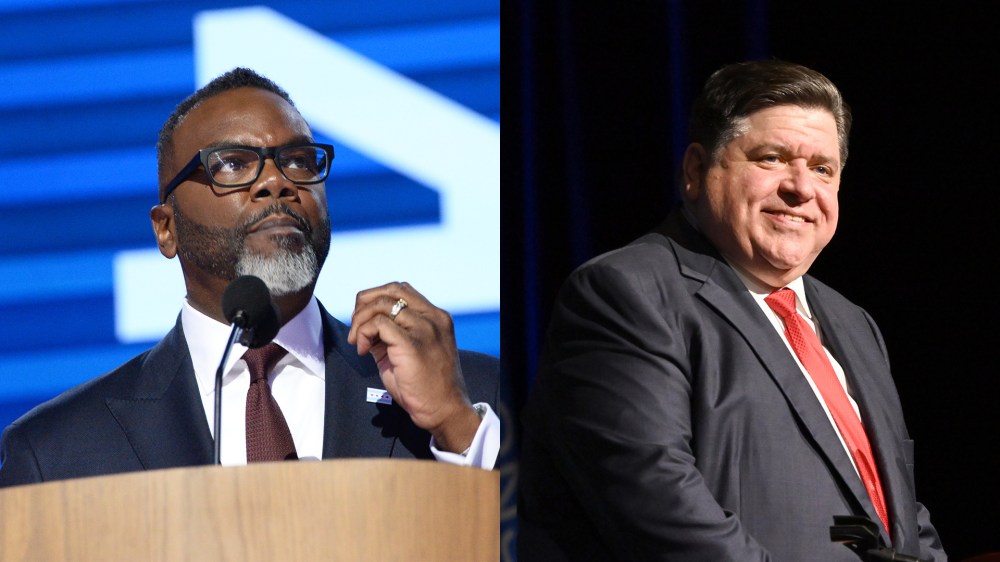 Getty Images
Getty Images
DOJ sues Chicago for ‘thwarting’ federal law with ‘sanctuary city’ policies
By Jodie Hawkins (Senior Producer)
- The Department of Justice filed a lawsuit against Illinois and Chicago. The lawsuit accuses city, county and state authorities of “thwarting” federal immigration law over several years.
- The complaint claims that Illinois laws make it harder for federal authorities to detain dangerous criminals.
- The lawsuit also said state laws facilitate criminals’ release into the community.
Full Story
The Trump administration sued the state of Illinois, the city of Chicago and local officials over laws creating a so-called “sanctuary city.” In the lawsuit filed by the Department of Justice Thursday, Feb. 6, federal prosecutors argue that local and state laws violate federal immigration law.
Media Landscape
See who else is reporting on this story and which side of the political spectrum they lean. To read other sources, click on the plus signs below. Learn more about this dataBias Distribution
Left
Trump administration sues Illinois and Chicago over immigrant sanctuary policies
Click to see story on CNNJustice Department sues Chicago and Illinois over ‘sanctuary’ laws
Click to see story on nprTrump’s Justice Department sues Gov. JB Pritzker, Mayor Brandon Johnson over sanctuary status
Click to see story on Chicago Sun TimesJustice Department sues Chicago and Illinois over immigration policies, welcoming city status
Click to see story on NBC ChicagoUS Government Sues Illinois and Chicago for Impeding Immigration Efforts
Click to see story on U.S. NewsTrump administration sues Illinois and Chicago over immigrant sanctuary policies
Click to see story on CBS58Trump administration sues Chicago over ‘sanctuary city’ laws
Click to see story on BBC NewsUS sues Illinois, Chicago for impeding immigration efforts
Click to see story on ReutersTrump administration sues Illinois and Chicago over immigrant sanctuary policies
Click to see story on KRDOTrump’s DOJ sues Illinois and Chicago over sanctuary city policies
Click to see story on NewsweekTrump administration sues Chicago in latest crackdown on ‘sanctuary’ cities
Click to see story on Pioneer PressDOJ sues Chicago, Illinois and Cook County over sanctuary city policies
Click to see story on abc 7 ChicagoUS sues Illinois, Chicago for impeding immigration efforts
Click to see story on WTVBTrump’s DOJ Suing Chicago, IL Over Sanctuary City Laws
Click to see story on PatchJustice Department sues Chicago and Illinois over ‘sanctuary’ laws
Click to see story on OPBTrump administration sues Illinois and Chicago over immigrant sanctuary policies
Click to see story on KESQTrump administration sues Chicago and Illinois in latest crackdown on `sanctuary’ cities
Click to see story on WFSBDOJ sues Illinois and Chicago over immigration policies
Click to see story on WFLDUS sues Illinois, Chicago for impeding immigration efforts
Click to see story on Investing.comTrump administration sues Chicago, state of Illinois over sanctuary laws — and vows more lawsuits to come
Click to see story on New York PostTrump DOJ sues Chicago in first major sanctuary city case – Washington Examiner
Click to see story on Washington ExaminerJustice Department sues Illinois, Chicago over sanctuary city laws
Click to see story on Just the NewsUntracked Bias
Trump sues Chicago and Illinois over laws to protect illegal immigrants
Click to see story on O AntagonistaTrump’s DOJ Sues Illinois and Chicago Over Sanctuary City Policies
Click to see story on BizTocUS government sues Illinois and Chicago for impeding immigration efforts – Blue Water Healthy Living
Click to see story on Blue Water Healthy LivingTrump DOJ slaps Illinois, Chicago with lawsuit over sanctuary laws – Democratic Accent
Click to see story on democraticaccent.comBLK ALERTS – Justice Department sues Chicago and Illinois over ‘sanctuary’ laws
Click to see story on blkalerts.comDepartment of Justice sues Chicago and Illinois for immigration policies
Click to see story on Telemundo ChicagoThe legal filing comes a day after the U.S. Senate confirmed Attorney General Pam Bondi, who immediately issued a memo restricting sanctuary cities from accessing Justice Department funds.
It also follows several immigration actions in the first weeks of Donald Trump’s presidency, including beefed up deportation efforts and executive orders to restrict birthright citizenship and declare an invasion at the Southern border.

Download the SAN app today to stay up-to-date with Unbiased. Straight Facts™.
Point phone camera here
What’s included in the lawsuit?
Thursday’s lawsuit mentions Chicago’s Welcoming City Ordinance and Illinois’ Trust Act, which prevent local law enforcement from participating in immigration enforcement and from sharing information about criminals’ immigration status with federal immigration authorities.
The DOJ wants the court to block the laws, saying they are unconstitutional.
The lawsuit also claimed the immigration policies make it harder for federal authorities to detain individuals, including dangerous criminals, and make it easier for those criminals to be released back into the community.
The complaint stated that federal officers are put in tough situations when state and local law enforcement limit the sharing of basic information and block federal officers from accessing people in local custody when they’re released.
How are Illinois officials responding?
Illinois Gov. JB Pritzker posted to X Thursday in response to the lawsuit.
“On the day after the election, I made a promise to the people of Illinois: when it comes to threats to our freedom, health, or security, if you come for my people, you come through me,” Pritzker said.
On the day after the election, I made a promise to the people of Illinois: when it comes to threats to our freedom, health, or security, if you come for my people, you come through me.
— Governor JB Pritzker (@GovPritzker) February 6, 2025
Cook County Board President Toni Preckwinkle commented Thursday on defending against the Trump administration’s policies.
“We’re going to fight back,” Preckwinkle told ABC 7 News. “We will pursue every legal opportunity to defend the programs that we believe in and defend our values.”
The Chicago Police Department and the Cook County Sheriff are also named in the complaint, but neither have commented on the lawsuit.
The day before President Donald Trump took office, Chicago Mayor Brandon Johnson voiced his opposition to Trump’s immigration reforms.
In a post to X, Johnson said, “Chicago stands strong: regardless of the circumstances, our commitment to protecting and supporting this city remains unwavering. We will continue to fight for the justice and safety of all who call this place home.”
Chicago stands strong: regardless of the circumstances, our commitment to protecting and supporting this city remains unwavering. We will continue to fight for the justice and safety of all who call this place home. https://t.co/x30vx76MXz
— Mayor Brandon Johnson (@ChicagosMayor) January 19, 2025
Chicago’s Mayor set to testify before Congress
The DOJ’s lawsuit comes as Johnson is set to testify before Congress regarding the city’s sanctuary status.
The hearing, scheduled for Feb. 11, will focus on alleged consequences of sanctuary policies in Chicago and other cities.
ICE statistics
According to ICE, from 2016 to 2025, federal agents arrested 13,564 noncitizens in Illinois.
Thursday’s complaint says that many of those arrested faced serious charges, including assault, theft, and drug or sex-related offenses, the lawsuit claims.
Media Landscape
See who else is reporting on this story and which side of the political spectrum they lean. To read other sources, click on the plus signs below. Learn more about this dataBias Distribution
Left
Trump administration sues Illinois and Chicago over immigrant sanctuary policies
Click to see story on CNNJustice Department sues Chicago and Illinois over ‘sanctuary’ laws
Click to see story on nprTrump’s Justice Department sues Gov. JB Pritzker, Mayor Brandon Johnson over sanctuary status
Click to see story on Chicago Sun TimesJustice Department sues Chicago and Illinois over immigration policies, welcoming city status
Click to see story on NBC ChicagoUS Government Sues Illinois and Chicago for Impeding Immigration Efforts
Click to see story on U.S. NewsTrump administration sues Illinois and Chicago over immigrant sanctuary policies
Click to see story on CBS58Trump administration sues Chicago over ‘sanctuary city’ laws
Click to see story on BBC NewsUS sues Illinois, Chicago for impeding immigration efforts
Click to see story on ReutersTrump administration sues Illinois and Chicago over immigrant sanctuary policies
Click to see story on KRDOTrump’s DOJ sues Illinois and Chicago over sanctuary city policies
Click to see story on NewsweekTrump administration sues Chicago in latest crackdown on ‘sanctuary’ cities
Click to see story on Pioneer PressDOJ sues Chicago, Illinois and Cook County over sanctuary city policies
Click to see story on abc 7 ChicagoUS sues Illinois, Chicago for impeding immigration efforts
Click to see story on WTVBTrump’s DOJ Suing Chicago, IL Over Sanctuary City Laws
Click to see story on PatchJustice Department sues Chicago and Illinois over ‘sanctuary’ laws
Click to see story on OPBTrump administration sues Illinois and Chicago over immigrant sanctuary policies
Click to see story on KESQTrump administration sues Chicago and Illinois in latest crackdown on `sanctuary’ cities
Click to see story on WFSBDOJ sues Illinois and Chicago over immigration policies
Click to see story on WFLDUS sues Illinois, Chicago for impeding immigration efforts
Click to see story on Investing.comTrump administration sues Chicago, state of Illinois over sanctuary laws — and vows more lawsuits to come
Click to see story on New York PostTrump DOJ sues Chicago in first major sanctuary city case – Washington Examiner
Click to see story on Washington ExaminerJustice Department sues Illinois, Chicago over sanctuary city laws
Click to see story on Just the NewsUntracked Bias
Trump sues Chicago and Illinois over laws to protect illegal immigrants
Click to see story on O AntagonistaTrump’s DOJ Sues Illinois and Chicago Over Sanctuary City Policies
Click to see story on BizTocUS government sues Illinois and Chicago for impeding immigration efforts – Blue Water Healthy Living
Click to see story on Blue Water Healthy LivingTrump DOJ slaps Illinois, Chicago with lawsuit over sanctuary laws – Democratic Accent
Click to see story on democraticaccent.comBLK ALERTS – Justice Department sues Chicago and Illinois over ‘sanctuary’ laws
Click to see story on blkalerts.comDepartment of Justice sues Chicago and Illinois for immigration policies
Click to see story on Telemundo ChicagoStraight to your inbox.
By entering your email, you agree to the Terms & Conditions and acknowledge the Privacy Policy.
MOST POPULAR
-
 Getty Images
Getty Images
Transcripts show ’60 Minutes’ edited Kamala Harris’ remarks during interview
Watch 4:056 hrs ago -
 Getty Images
Getty Images
Department of Education staffers told not to accept Trump’s resignation: Reports
Watch 2:1416 hrs ago -
 Getty Images
Getty Images
Attorney General Bondi orders pause in federal funding for sanctuary cities
Watch 2:1216 hrs ago -
 Getty Images
Getty Images
Miami Heat trade disgruntled star Jimmy Butler to Golden State Warriors
Watch 1:3217 hrs ago




